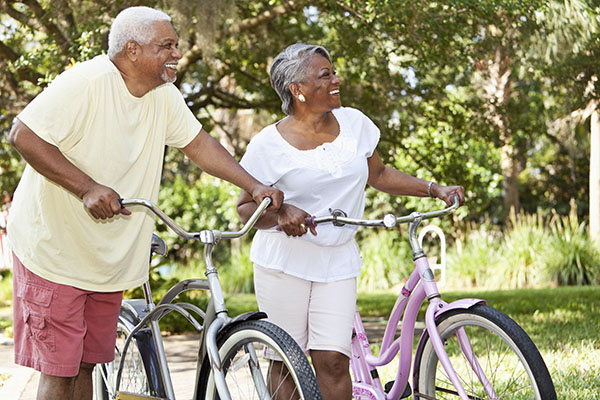
National Teacher Day, Mother's Day, Memorial Day, Nurses Day, even Coconut Cream Pie Day — there are plenty of holidays in May to get excited about. As you show appreciation for teachers, plan cookouts for Memorial Day and bake a delicious coconut cream pie, don’t forget to celebrate National Senior Health and Fitness Day.
May 25 is Senior Health and Fitness Day, a day to remind older adults to get moving. Physical activity is crucial for all ages, but as you get older, it becomes even more important in reducing illness and keeping you safe.
Unfortunately, not as many older adults are getting as much exercise as they should.

The Magic of Exercise: Physical, Mental, and Social Benefits of Physical Activity on Senior Health
"You've heard it before, and you'll hear it again — exercise is extremely good for you. Its benefits have been proven time and time again, and it continues to be recommended as a part of staying healthy physically, mentally and socially," explains Renee McDonough, MD, Associate Medical Director of Senior Living at Chester County Hospital.
As you get older, these benefits become even more significant and important.
Physical Benefits of Exercise
Let's start with the obvious. Physical activity improves your physical health by combating health issues that many people face as they get older. Some physical benefits of exercise include:
- Helping you achieve — and maintain — a healthy weight
- Reducing your risk of chronic conditions, such as heart disease, high blood pressure, high cholesterol, and type 2 diabetes
- Reducing your risk of some cancers, such as colon, breast, uterine, and lung cancers
- Slowing the loss of bone density
- Lowering your risk of falls
- Improving your quality of sleep
Mental Benefits of Exercise
Exercise helps more than just your body — it helps your mind, too.
To start, it can boost your mood. When you exercise, your body releases chemicals that make you feel more relaxed, happier and less anxious. Since about a quarter of older adults struggle with mental health concerns, such as anxiety, depression or substance abuse, this benefit is key as you get older.
According to Dr. McDonough, "Physical activity can also help you stay sharp as you age. When you get moving, you improve your cognitive skills by releasing chemicals that improve the function of your brain."
Social Benefits of Exercise
Many older adults struggle to maintain a strong social network, leading to feelings of loneliness and isolation. Factors like living alone, the loss of loved ones and chronic illness may all play a role in this risk.
Fortunately, exercise can help you feel connected. Whether you take a dance class with others or go on a walk with a close friend, physical activity can be a great way to stay engaged with others.
How Much Exercise Should Older Adults Get?
In order to access the many benefits of exercise, you need to get moving. Yet, as you get older, not only can that be more challenging, but you may also face more restrictions.
"In general, adults should get at least 150 minutes of moderate-intensity (you can say a few words in a row, but singing would be a challenge) or 75 minutes of vigorous-intensity (you can't say more than a few words without pausing for a breath) physical activity each week. Or you can do a combination of the two," says Dr. McDonough.
However, older adults may have individual needs and restrictions. To identify how much exercise you should aim for each week, talk to your healthcare provider. They can also help create a safe and effective exercise plan for your age.
5 Ways Older Adults Can Start — and Keep — Moving
No matter your physical activity level right now, here are 5 simple ways to incorporate exercise into your daily routine.
- Start slowly. Due to physical or emotional challenges, getting moving when you’re older can be tough. Set attainable goals, like getting moving for 15 minutes a day, and build up from there. Try brisk walking, swimming or dancing to start.
- Determine the time of day when you feel most energized. It's normal to have less energy as you age. Take advantage of any boosts of energy you do have, such as in the morning or early afternoon and schedule your workouts accordingly. Consider a morning yoga class or an evening bike ride.
- Do something you love. Working out can be fun with a little creativity. Whether you walk laps while window shopping in the mall, do some gardening in your backyard, or throw a frisbee with your dog, make exercise enjoyable — so you'll stick to it.
- Recruit your friends and family. No one ever said you needed to exercise alone. Ask your friends or family members to join you in getting active, which will make physical activity more fun and keep you accountable. Check out your local resources for more community support, such as the West Chester ACAC or YMCA.
- Reward yourself. Tell your body "thank you" with a nice reward after your workout. Take a bubble bath, make a delicious (nutritious) snack or meal, or watch another episode of your favorite TV show.
Incorporating physical activity into your daily routine at any age can be tough. As you get older, you may face new challenges with exercise. With a little determination and plenty of support, make the commitment to support your body and mind this Senior Health and Fitness Day.
Looking for Ways to Incorporate Physical Activity Into Your Routine?
Talk to your Chester County Hospital Primary Care Provider, who can provide support and guidance as you start — or continue — your exercise routine.
Exercise is just the beginning. Here are 6 ways to prevent health problems as you get older.